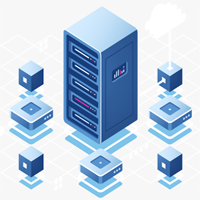
Sri Lanka Web Hosting
Stable, Secure and Reliable | Friendly 24 x 7 customer support | 17 Years of Proven Service
Web hosting empowers you and anyone with a computer and internet connection to own a piece of cyberspace. In your hosting space, you can have news, bulletins, documents, data, files (your web site) and your own e mail accounts (private mail server) to accept mail, all in the context of you or your business. This is your space and to get this space you either have to own a piece of the physical internet with a network connection to the internet backbone and computer(s) operating as web server(s) offering access to your files and mails, for people on the internet to view your web site or send and receive email with you.
The cost of owning a direct connection to the backbone and a server dedicated to a web site and email is out of reach for the average business and especially general members of the internet. Even running a web site and mail server on your own computer when it is connected to the internet requires a lot of technical ability and knowledge (and 24 x 7 monitoring) .
In our modern society, for every person in business or with a career in most industries today, it is imperative to have a place in cyberspace, not just to be competitive but to survive. web hosting companies were born out of this great need to provide an environment for the people to own a piece of web hosting space, to offer an environment where people could have their piece of web hosting space on the internet 24/7 without the great cost. web hosting companies developed a model where they could split up areas on the servers connected to the backbone and rent this space, cutting the costs across many people sharing the server (shared web hosting) and backbone connection to the internet. The web host will also provide you a web address (Domain Name Registration) and it is a separate service.
Domain Name Registration Sri Lanka
Domain names are used in various networking contexts and application-specific naming and addressing purposes. They are organized in subordinate levels (subdomains) of the DNS root domain, which is nameless. The first-level set of domain names are the top-level domains (TLDs), including the generic top-level domains (gTLDs), such as the prominent domains com, net and org, and the country code top-level domains (ccTLDs) sus as .lk domains. Below these top-level domains in the DNS hierarchy are the second-level and third-level domain names that are typically open for reservation by end-users that wish to connect local area networks to the Internet, run web site(s) (eg: www.webhost.lk), or create other publicly accessible Internet resources. The registration of these domain names is usually administered by domain name registrars who sell their services to the public.
Individual Internet host computers use domain names as host identifiers, or hostnames. Hostnames are the leaf labels in the domain name system usually without further subordinate domain name space. Hostnames appear as a component in Uniform Resource Locators (URLs) for Internet resources such as web sites (e.g webhost.lk).
Domain names are also used as simple identification labels to indicate ownership or control of a resource. Such examples are the realm identifiers used in the Session Initiation Protocol (SIP), the DomainKeys used to verify DNS domains in e-mail systems, and in many other Uniform Resource Identifiers (URIs).
An important purpose of domain names is to provide easily recognizable and memorizable names to numerically addressed Internet resources. This abstraction allows any resource (e.g., website) to be moved to a different physical location in the address topology of the network, globally or locally in an intranet. Such a move usually requires changing the IP address of a resource and the corresponding translation of this IP address to and from its domain name.
Domain names are often referred to simply as domains and domain name registrants are frequently referred to as domain owners, although domain name registration with a registrar does not confer any legal ownership of the domain name, only an exclusive right of use.




















